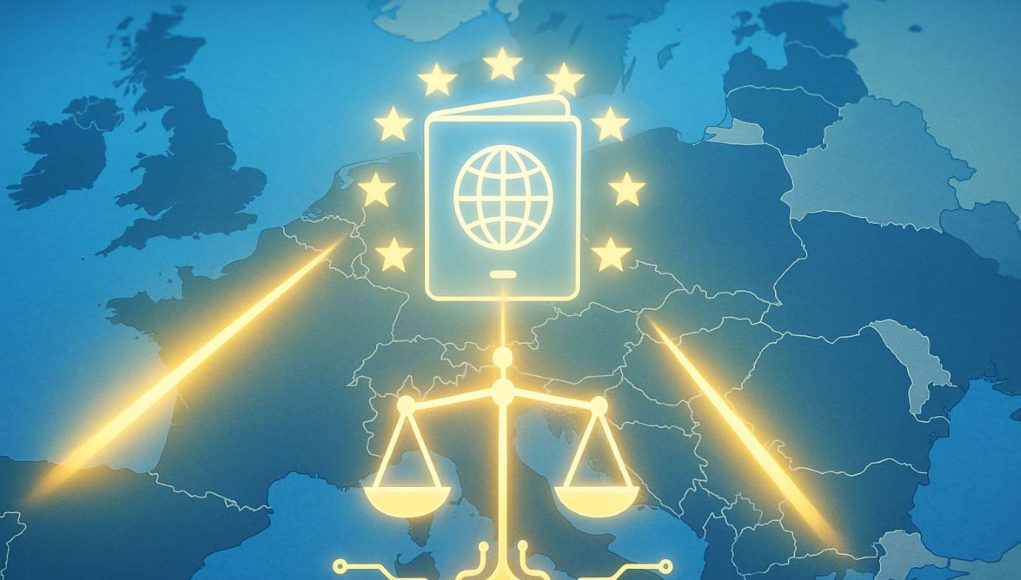The EU’s landmark MiCA regulation was designed to unify the EU crypto market, but cracks are already showing. France’s AMF, backed by Italy’s CONSOB and Austria’s FMA, has warned it may block crypto passporting if stricter oversight is not introduced. This marks a bold stance in France’s crypto regulation and exposes a brewing power struggle over who should police digital assets: national regulators or the EU’s central authority, ESMA.
What MiCA Promised
When it came into force, the MiCA regulation was hailed as the world’s first comprehensive crypto framework. Its core promise was harmonization. Crypto firms authorized in one EU country could use that license to operate across the bloc. This “passporting” model aimed to replace the patchwork of national regimes and create a single EU crypto market.
But the French AMF argues the promise is faltering. While rules are uniform on paper, enforcement is still handled by national authorities. That, they say, leaves room for uneven standards and undermines the idea of EU crypto harmonization.
France’s “Atomic Weapon” Threat
French regulator AMF President Marie-Anne Barbat-Layani described the option to block cross-border recognition of licenses as an “atomic weapon.” Headlines in several outlets summarized it as France threatens to block MiCA, a move that could fracture the EU’s single market.
The concern is that firms may secure approvals in jurisdictions with weaker scrutiny and still gain access to investors across Europe. This reflects the broader AMF crypto stance, which has long emphasized strict oversight.
The AMF says this puts investor protection in crypto at risk and could expose the financial system to cyber vulnerabilities. Italy’s CONSOB and Austria’s FMA echoed these concerns. Together, they are pressing for urgent reforms.
Fault Lines in EU Supervision
The controversy highlights the tension between a uniform EU regulatory framework and fragmented implementation. Smaller states such as Malta, Lithuania, and Cyprus have been accused of enabling regulatory shopping in crypto. These jurisdictions often attract firms with lighter oversight and faster licensing.
For example, some countries issue an EU crypto license in weeks, while others take months. The result is uneven standards despite a shared rulebook.
Similar challenges have plagued EU financial law before. Banking under CRD IV and investment services under MiFID II both saw uneven national enforcement, despite being based on uniform directives.
>>> Read more: Germany Leads Crypto Regulation in the EU
What the Trio Wants
France, Italy, and Austria are calling for sweeping changes to strengthen the MiCA regulation:
- ESMA oversight of the largest crypto-asset service providers (CASPs), removing supervision from national regulators.
- Mandatory cybersecurity audits for crypto firms before authorization or renewal.
- A centralized EU whitepaper repository for new tokens.
- Stricter controls on EU intermediaries that route client orders to non-MiCA offshore platforms.
They argue that these steps are vital for investor safety and market stability. Supporters say enhanced ESMA oversight would reduce fragmentation and strengthen trust in the single market.
Pushback and Counterarguments
Not all EU countries are convinced. Jurisdictions that benefit from lighter regimes, such as Malta and Lithuania, warn that strict measures could hurt competitiveness. Industry voices also argue that expanding ESMA’s role may create regulatory bottlenecks.
Still, the warnings from Paris, Rome, and Vienna carry weight. Italy’s CONSOB crypto regulation has often aligned with France in pushing for tougher standards. The Austrian FMA crypto regulation also emphasizes investor safety.
Market and Political Implications
If France follows through on its threat to block passporting, the EU crypto market could fragment. Investors and companies would face uncertainty over which licenses are truly valid across borders.
At the same time, the pressure increases momentum for Brussels to expand EU digital assets regulation. ESMA’s potential role in supervising major firms signals that the bloc may accelerate toward stronger, EU-level control.
>>> Read more: EU Payments at a Crossroads: Digital Euro vs Stablecoins
France’s challenge to the MiCA regulation is more than a technical dispute. It is a test of whether the EU can deliver on the promise of a unified digital-asset framework. By pushing for ESMA authority and stricter safeguards, Paris and its allies highlight deep concerns about uneven enforcement and weak investor protection in crypto.
The coming months will show whether Europe strengthens MiCA into a robust regime or risks seeing its single-market vision splinter under regulatory strain.
Readers’ frequently asked questions
Can France legally block a MiCA passport granted by another EU country?
Yes, but only in narrow, risk-based situations. MiCA’s passport is meant to work EU-wide, but a host regulator (e.g., France’s AMF) can take precautionary, proportionate, time-limited measures if it sees serious investor-protection or market-integrity risks. The host must notify the home regulator and EU bodies (including ESMA) and seek a coordinated resolution. It is not a blanket revocation EU-wide; it restricts the local use of that passport pending remediation.
If ESMA gets direct supervision of major CASPs, what actually changes for firms?
One lead supervisor for big players, more consistent enforcement, and higher baseline controls (governance, IT/cyber, outsourcing, incident reporting). Expect independent cybersecurity audits, tighter documentation, and possibly longer authorization/renewal timelines, but clearer EU-level expectations and less jurisdiction shopping.
I’m a customer of a passported exchange. What should I do if its passport is contested in my country?
Follow the firm’s official notices and your regulator’s updates. Verify withdrawal options, reduce exposure to complex products during uncertainty, and download account statements/tax reports. Keep some liquidity with a provider licensed in your home country or one with a strong compliance history, and avoid opening new positions until the status is clarified.
What Is In It For You? Action items you might want to consider
Actions for EU crypto users
Verify your provider’s legal entity and passport status in your country via the national register. Test a small withdrawal and download recent statements now rather than during a dispute. Until the license status is clearly recognized, avoid opening new leveraged or derivative positions, and keep a second, locally licensed venue as a fallback for liquidity.
Prep for CASPs and fintechs applying under MiCA
Commission an independent cybersecurity audit and document incident response, outsourcing, and any routing to non-EU venues. Prepare customer-notice templates for a “passport contested” scenario and rehearse the workflow. Reassess the choice of home regulator, since speed gains can be offset by host-country challenges, and assemble a whitepaper dossier in case filings are centralized at the EU level.
Steps for investors and analysts
Track signals on ESMA oversight and any host-country interventions that could affect market access. Stress-test on- and off-ramps, staking, and derivatives in case a venue is restricted. Tilt exposure toward providers with strong compliance records and price a higher risk premium for firms licensed in jurisdictions that are more likely to face passporting disputes.











[…] >>> Read more: France, Italy & Austria Challenge MiCA; Push ESMA Oversight […]
[…] >>> Read more: France, Italy & Austria Challenge MiCA; Push ESMA Oversight […]